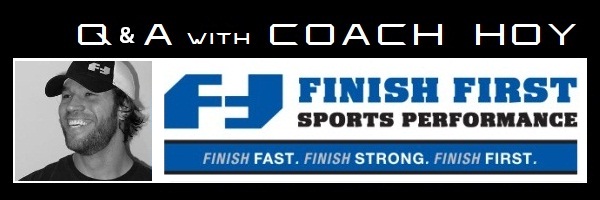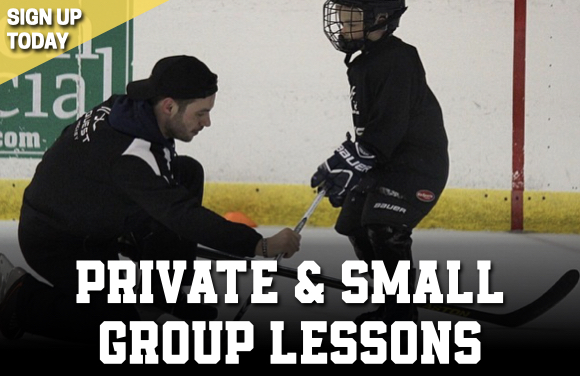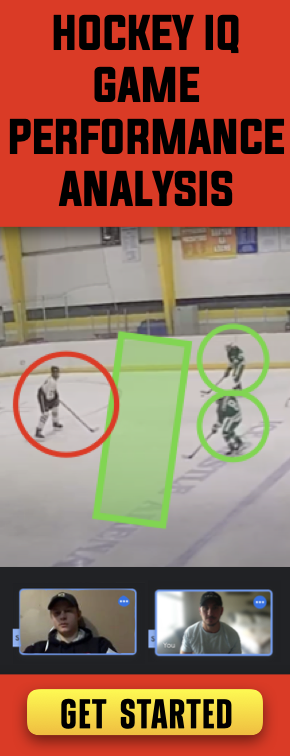
Q & A with Coach Hoy Part 2
March 21, 2013
Along with on-ice skill development training, off-ice strength and conditioning training is critical to the success of any hockey player. With the proper plan, guidance and approach, off-ice strength and conditioning training can produce tremendous gains on the ice, while reducing the risk of injury.
With this in mind, Quest Hockey teamed up with professional strength and conditioning coach Jeremy Hoy (@CoachHoy) of Finish First Sports Performance, to provide Quest Hockey players with access to his valuable services and insight. We hope you enjoy part 2 of the Q & A blog series with Jeremy detailing the importance of off-ice strength and conditioning training as it relates to hockey players. If you have a question you’d like Jeremy to answer in a future blog entry, please email it to us at info@questhockey.com.
Question:
My 12 year old hockey player wants to get to the next level. He currently plays A major, but his goal is to make a AAA hockey team. Should we consider off-ice training? Year round or just in the off-season?
@CoachHoy Response:
Yes. Off-ice training should not be an afterthought, but rather an understood necessity. Off-ice training is a crucial element to athletic development, balance, and injury risk reduction. Not only should it be considered, it should be included in every team program. Aside from the performance related benefits, it is important for any young person to begin to learn the proper elements and techniques of exercise and nutrition, to create and realize life-long habits and benefits (especially with the cuts and gaps of most school PE programs). Off-ice training should be done on a year round basis, to not only prepare for better in-season performances, but to also address potential imbalances, over-use issues, and to maintain strength and power during the in-season period. A common quote that is thrown around these days is “There is no off-season.” Well, unfortunately, many coaches took this to mean that you need to play (compete) year-round. As a result, often times you get competition without proper instruction time for skill development, and you get overuse issues and injuries. If you want to be the best, then you need to be deliberate and disciplined. Work on all of your weaknesses, as well as your strengths. Get better every day. What are you doing to be better tomorrow than you are today?
Question:
At what age should hockey players focus on hockey specific off-ice training? What should the focus be?
@CoachHoy Response:
Beginning to do more specific movements for ice hockey is less dependent on age, and more specific to training experience and fitness levels. The focus should initially be on improving the capacity for the player to perform more work, or more high quality work in a specific time frame, i.e., improve general work capacity or general fitness levels across all areas (flexibility, mobility, strength, power, speed, agility, quickness, etc.). Specificity occurs unique to each individual player and with exercise selection. However, a well designed program for sports performance could fit and improve general fitness levels and capacity for anyone. Specificity is designed for players once they have progressed through general work capacity programming. This may take several years. Again, remember, that subtle changes can be made to general programs to make them more specific to a given sport, especially with regards to aerobic or anaerobic conditioning. Programs should be designed specific to each unique individual. The most specific type of exercise a player can do is to actually skate and play the game. Aside from this, it is the job of the strength and conditioning coach to improve performance while reducing the risk of injury. Exercises and methods are chosen that will most benefit the player and have the highest impact or transfer to the sport of ice hockey.
Hockey players need to focus on total body strength through movements in all planes of motion, at different speeds, and using both single and double legs (and arms). They need to be well balanced and able to push forcefully off of one leg. They need to be explosive – upper and lower body – with great spine mobility (specific to the thoracic spine). Grip strength needs to be excellent as well as core (hips, abdominal region—anterior and posterior) strength, power, endurance and stability needs to be high. They also need to be conditioned well to have a higher lactate threshold—ability to execute anaerobic sprints with as close to full recovery between sprints as possible. Yes, goalies do train slightly differently, with more up and down power and side to side specific movements, plus additional dynamic vision training activities. All hockey players need to have their bodies well conditioned for resiliency (to absorb and create impact). Plyometric training has been shown to be effective and have a high transfer effect when done properly and the specific to the desired end result of each type.
Jeremy Hoy’s Bio:

Pittsburgh based Professional Strength and Conditioning Coach, Jeremy Hoy, has a Master’s Degree in Performance Enhancement and Injury Prevention and Bachelor’s Degree in Exercise and Sport Science. He is a certified Strength and Conditioning Specialist (CSCS) by the NSCA, a certified Performance Enhancement Specialist (PES) by the NASM, a certified Speed and Explosion (Power) Specialist by NASE. He is also USAW certified and FlexBand certified.
He has been physically and mentally developing hockey players in the Pittsburgh area since 2000, and has an extensive client list, ranging from mite players to major junior, college, professional and Olympic players. He contributes as a performance writer to several sports websites, as a speaker and hands on instructor at annual sports performance clinics, USA Hockey clinics, USHL combines, and local hockey camps.
He is the head strength and conditioning coach for the Youngstown Phantoms USHL team, and the Robert Morris University Men’s NCAA Division 1 Ice Hockey team. He is also the physical and mental performance consultant for many Pittsburgh youth hockey teams, both boys and girls.
Jeremy Hoy has a fully equipped specialized training facility in Robinson township where athletes and fitness clients of all different ages and levels can be found working to improve their game and improve their mental and physical fitness. More information can be found at www.finishfirstsports.com, or by calling 866-468-2231. Finish First Sports Performance: Preparing athletes to perform their best when it matters most.


